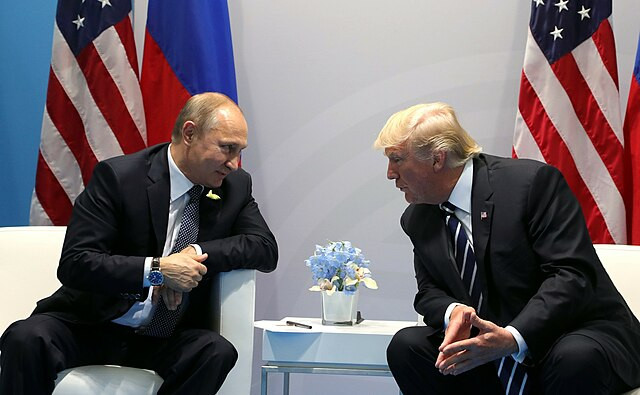President Donald Trump announced Wednesday that negotiations to end the war in Ukraine will begin "immediately," following what he described as a "lengthy and highly productive" telephone call with Russian President Vladimir Putin. It marks the first publicly acknowledged conversation between the two leaders since Trump assumed office last month, signaling a significant move toward reshaping U.S. engagement in the nearly four-year-old conflict.
In a readout posted on Truth Social, President Trump stated: "We discussed Ukraine, the Middle East, Energy, Artificial Intelligence, the power of the Dollar, and various other subjects." He further added: "We agreed to work together, very closely, including visiting each other's Nations. We have also agreed to have our respective teams start negotiations immediately, and we will begin by calling President Zelenskyy, of Ukraine, to inform him of the conversation, something which I will be doing right now."
Kremlin spokesman Dmitry Peskov confirmed that the call lasted roughly 90 minutes, while White House Press Secretary Karoline Leavitt declined to reveal whether the Trump administration would back Ukraine's pre-war borders. She said, "Again, these negotiations are ongoing. I will allow the president to divulge any red lines that he may set." The development follows Trump administration statements that the United States is shifting its foreign policy priorities away from European security toward securing U.S. borders and deterring a possible war with China.
Shortly after speaking to Putin, President Trump phoned Ukrainian President Volodymyr Zelenskyy in a conversation lasting about an hour. The president later posted: "He, like President Putin, wants to make PEACE. We discussed a variety of topics having to do with the War, but mostly, the meeting that is being set up on Friday in Munich, where Vice President JD Vance and Secretary of State Marco Rubio will lead the Delegation." Some officials close to the talks have indicated that final terms may include concessions on Ukrainian territory, coupled with security guarantees for Kyiv-although specifics remain unclear.
Defense Secretary Pete Hegseth offered new details on the administration's stance at a Ukraine Defense Contact Group meeting in Brussels. He emphasized that returning to Ukraine's pre-war borders is an "unrealistic objective" and signaled the United States no longer supports Ukraine's bid to join NATO. "Chasing this illusionary goal will only prolong the war and cause more suffering," Hegseth said. He proposed the potential deployment of a non-NATO force of peacekeepers, but stressed there would be "no U.S. boots on the ground."
Trump's call with Putin also included a reference to what he called "my very strong Campaign motto of, 'COMMON SENSE.'" The president remarked, "President Putin even used my very strong Campaign motto of, 'COMMON SENSE.' We both believe very strongly in it." According to sources familiar with the negotiations, a prisoner exchange involving wrongfully detained American Marc Fogel served as a signal to the administration that progress with Moscow might be possible. Steve Witkoff, a top negotiator on the conflict, said the release was "an indication of what the possibilities are."
Hegseth's tone regarding NATO contrasts sharply with the approach of previous administrations. Former President Joe Biden had refrained from direct talks with Putin since labeling him a war criminal, and sought to rally global support for Kyiv without ceding any Ukrainian territories. In contrast, President Trump has suggested that full NATO obligations, including Article 5 mutual defense commitments, warrant reevaluation if alliance members fail to meet his administration's spending requirements.
- Key Points on the Evolving Conflict
- War started three years ago with Russia's full-scale invasion
- President Trump claims it could have ended on his "first day" in office
- Defense Secretary Pete Hegseth calls Ukraine's NATO membership "unrealistic"
- Non-NATO peacekeeping mission proposed as a possible solution
Vice President JD Vance and Secretary of State Marco Rubio are set to meet Zelenskyy on Friday in Munich, potentially laying the groundwork for the first tangible steps toward a comprehensive peace deal. Some analysts warn that any deal may require Ukraine to cede disputed territories in return for a long-term agreement, potentially cementing Russia's hold on regions it captured since the start of the conflict. Administration officials note that "robust security guarantees" will likely form a central pillar of any treaty.





